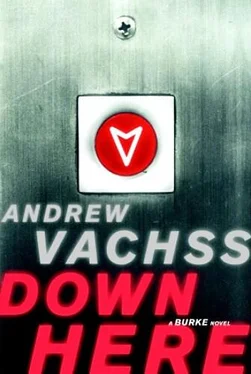“It’s not such a . . .”
“Come on with it,” the Prof urged him. “If my son says it’s fun, I got to know how it’s done.”
“Well,” Terry said, sitting down, “there was this girl. At school.” He saw me exchanging looks with the Prof, said, “Not my girl. I wasn’t . . . interested in her like that. She was . . . my friend. Anyway, Tatrine’s very socially active. Mostly green stuff, but she never saw a cause she didn’t like.
“She met this guy at a teach-in she went to. It was all about prison conditions. This guy, he told her that he was an ex-con, right up front. Tatrine, she treated it like it was a credential. . . .”
Terry caught himself, turning red as he realized who he was talking to. And where his mother had spent some of her youth. “I didn’t mean it . . . I didn’t mean it was a . . . bad thing, all by itself. Just . . . what you always say, Prof.”
“Only thing that’s true is what you do,” the Prof acknowledged. “The Walls don’t make the calls.”
“Right. So, anyway, Tatrine was getting all caught up in this guy. I mean, quoting him, like he was an oracle or something. It made me nervous. So I asked her, just casual one day, what had he done time for.
“Tatrine said it had been an armed robbery. This guy—her boyfriend by then, I guess—said he had done it when he was, you ready for this, ‘pre–socially conscious.’ He had some half-baked idea that the merchant was ripping off the community, so he figured he’d do a little justice by stealing from him.
“He told her he came to realize later that the merchant was part of a system, pre-programmed to act a certain way, and robbing him wasn’t the right thing to do. Tatrine told me this guy, he was a ‘change-agent’ now.”
“You didn’t buy his riff, so you thought you’d take a sniff?” the Prof said, nodding.
“It . . . I don’t know how to explain this, exactly. Mom says, sometimes, when people talk, you just know they’re wrong. Not about the facts—I mean they’re wrong people. I never heard him talk myself, but, even secondhand from Tatrine, I was . . .
“So I poked around until I found the Web site. And I put in his name. There were actually four guys with the same name in their system, but one was still incarcerated, and the other two were white, so they couldn’t be him. His date of birth sounded about right, from the way Tatrine described him, too.
“But it wasn’t any armed robbery he’d been sent away for. It was sodomy in the second degree. I looked that one up, too. The only way he could have been convicted of that is if the victim couldn’t consent because they were drunk, or drugged, or . . .”
“Or a kid,” I finished for him.
“Yeah,” he said, teeth clenched.
“You showed this all to Tatrine?”
“Yeah.”
“And she didn’t believe you?”
“Not . . . not at first. After a while, she did, I know.”
“How?”
“Because she came over to where I was sitting, in the library, and asked me to come outside. She told me I had been right. About her . . . about him, I mean. He admitted it. He told her the whole thing had been a pack of lies, cooked up by his little stepsister, because she resented her mother’s new husband. That was his father—they were all living together.
“He told Tatrine he had pleaded guilty—he must have thought she knew more than she really did—because they promised him only a four-year max. And he couldn’t take a chance on a jury believing the little liar; then they might have put him away forever.
“He said he never told people about it because they wouldn’t understand. He wasn’t ashamed of being in prison, but he knew nobody would ever give him a chance to tell his side of the story.”
“But Tatrine did, huh?” I said, reading his face.
“Yeah.”
And you wanted to tell her a few things yourself, didn’t you, kid? I thought, into the silence.
“How did it end up?” Clarence asked. Obviously, he had only heard the beginning of the story.
“I don’t know,” Terry said, not hearing the desolation in his own voice. “I see Tatrine around campus once in a while. But she never comes anywhere near me. And the number I had for her—it’s no good anymore.”
Three nights later. The trackdown I was working on was taking a lot longer than I had expected. I knew that the woman I was looking for had to be somewhere in New York State. And that she owned a house, most likely in a rural area.
But what I really needed was a phone number. When I have to approach people who knew my old face, voice contact is the smartest first move.
Any other time, I would have gone to Wolfe’s network. But I figured they wouldn’t be operational, not with all this hanging over her.
I couldn’t see the DA’s Office investing in full-time surveillance, and I didn’t think anyone they had was good enough to shadow Wolfe without her picking it up, anyway. But I wanted to be sure I was the first one to see whatever got turned up.
The phone made its noise.
“What?” I said.
“Hi, chief!” Pepper, almost back to full bounce. “Got time to meet with an old friend?”
“If it’s a good enough friend, I’ve always got the time.”
“Great! She’s a very good friend, but not an old one. In fact, you just met her recently.”
“Is there going to be anyone else there?”
“Oh, no, ” Pepper said. “You know how third wheels always spoil dates.”
“Right. Same place?”
“No. She’ll be at the message center—say, eleven?”
“Do you really think that’s an appropriate spot?”
“Why not?” Pepper said, a faint giggle under her voice. “It’s a nice, intimate little place. And you can decide where you want to go from there.”
“Eleven,” I promised.
“Okey-dokey,” she said.
I admired Pepper’s professionalism. Even if there was a wiretap order—which was way past unlikely—and even if they somehow knew which phone Pepper was using that night, nothing in our conversation would tell a listener that my date for the night was named Molly.
Istarted to make myself some soup, and sat down to think things through.
A few years back, Max and I were sitting in my booth at Mama’s. It was late afternoon, and we had already spent hours handicapping the night’s races at Yonkers. Mama had finally lost her patience. If we had been playing cards, she would have been fine with it. Mama loves gambling, but betting on horses always struck her as downright degenerate.
“No work today, right?” she demanded.
“We’re waiting, Mama,” I explained, for the fourth time. “We can’t go to work until tonight.”
“Work for making money. What you do, you lose money. Big circle, no end.”
Max hotly defended our two-man gambling syndicate, pulling out his notebook, with our fully documented record for the year to date. We had wagered a total of six thousand four hundred and twenty dollars, and had a solid sixty-five hundred in the kitty.
“So?” Mama sneered, profoundly unimpressed. “You not lose money, not lose money yet anyway. What is that? Just—how you say it?—big . . . hobby. Men always have hobby. Woman’s hobby is work.”
“We are working, Mama. It’s just not time yet to—”
“Sure, sure. Okay for you, Burke. You have no wife,” she said, adding a new accusation to her endless list. “And no baby. But you, ” she said, pointing a gun-barrel finger at Max, “no excuse.”
When Immaculata first came into Max’s life, Mama dismissed her as a “bar girl,” a wide-ranging insult that could mean just about anything. But a nanosecond after Max announced he was going to be a father, Immaculata went from no-status to goddess in Mama’s eyes. And ever since, Mama had been pounding Max’s blessed fortune in finding such a perfect woman into his head.
Читать дальше











